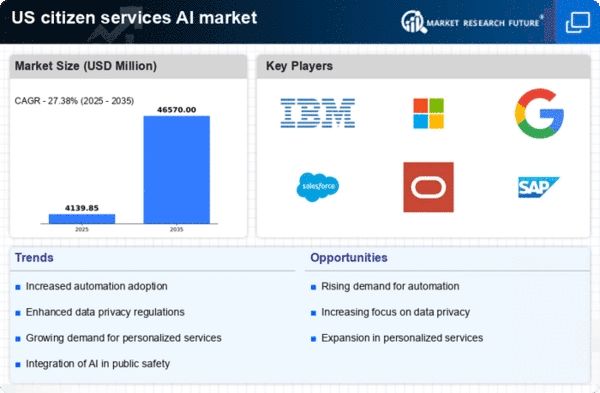Integration of Advanced Analytics
The integration of advanced analytics into the citizen services-ai market is transforming how government agencies operate. By leveraging data analytics, agencies can gain insights into citizen behavior and preferences, allowing for more tailored services. Recent data indicates that 45% of public sector organizations are utilizing predictive analytics to enhance decision-making processes. This capability enables agencies to anticipate citizen needs and allocate resources more effectively. Consequently, the citizen services-ai market is likely to see increased investment in analytics tools, fostering a more responsive and proactive approach to public service delivery.
Focus on Cost Reduction and Efficiency
A focus on cost reduction and efficiency is driving the citizen services-ai market as government agencies seek to optimize their operations. With budget constraints becoming increasingly prevalent, agencies are turning to AI technologies to automate routine tasks and reduce operational costs. Reports suggest that AI implementation can lead to cost savings of up to 20% in administrative functions. This financial incentive encourages agencies to explore AI solutions that not only enhance efficiency but also free up resources for more critical public service initiatives. Thus, the citizen services-ai market is expected to grow as agencies prioritize cost-effective strategies.
Legislative Support for AI Initiatives
Legislative support for AI initiatives is emerging as a crucial driver in the citizen services-ai market. Recent policies aimed at promoting technological innovation within the public sector are encouraging agencies to adopt AI solutions. For instance, funding allocations for AI projects have increased by 25% in the last fiscal year, reflecting a commitment to modernizing public services. This legislative backing not only facilitates the development of AI technologies but also fosters collaboration between government entities and tech companies. As a result, the citizen services-ai market is poised for growth, driven by supportive regulatory frameworks.
Growing Demand for Efficient Public Services
The citizen services-ai market is experiencing a notable surge in demand for efficient public services. Citizens increasingly expect quick and effective responses from government agencies, prompting a shift towards AI-driven solutions. This trend is evidenced by a reported 30% increase in the implementation of AI technologies within public sector organizations over the past year. As agencies strive to enhance service delivery, AI applications such as virtual assistants and automated response systems are becoming integral. This growing demand not only streamlines operations but also improves citizen satisfaction, thereby driving further investment in the citizen services-ai market.
Rising Citizen Expectations for Digital Services
Rising citizen expectations for digital services are significantly influencing the citizen services-ai market. As technology becomes more integrated into daily life, citizens demand seamless and user-friendly interactions with government services. Surveys indicate that 70% of citizens prefer digital channels for accessing public services, highlighting a shift in service delivery preferences. This trend compels government agencies to invest in AI solutions that enhance user experience and accessibility. Consequently, the citizen services-ai market is likely to expand as agencies strive to meet these evolving expectations and improve overall service quality.

















